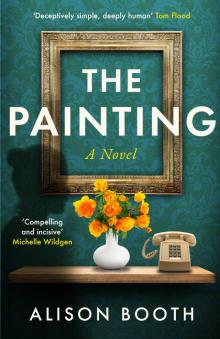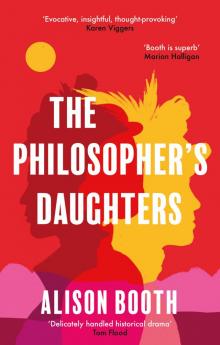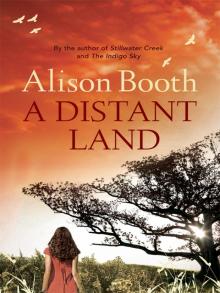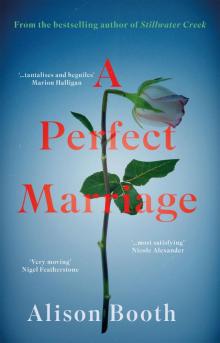- Home
- Alison Booth
The Philosopher's Daughters Page 14
The Philosopher's Daughters Read online
Page 14
At this moment Henry reappeared. At once he noticed the parcel that Harriet was holding, and his expression lightened. ‘The flute?’ he said.
‘Yes, the Louis Lot flute.’
‘Silver, not ebony?’
‘Yes, silver.’
‘That’s so the white ants won’t get it.’
Harriet laughed.
‘It’s true,’ Henry said. ‘Thank you very much, Harriet. You’ve made my day. It’s really good to see you again.’
Chapter 22
‘Rather Good at Cricket’
The Aboriginal batsman gave the ball a resounding thwack and drove it up into the air. Sarah clapped her hands as she watched it rise in an arc over Henry’s head, far beyond his reach, before descending into the lake beyond the boundary of the Port Darwin cricket field.
‘It’s a six!’ shouted one of the bystanders. ‘There’s no need to run!’
But the batsmen were already racing between the stumps as if their lives depended on it. Sarah laughed in sympathy. She’d been induced to learn the rules of cricket when she’d discovered that Henry played but she hadn’t found them easy. She glanced at Harriet, seated on a tartan rug by her side. Harriet disliked team sports but even she was looking amused. The batsmen continued running. The crowd began to cheer, stimulating the batsmen on to further runs. Eventually the two umpires forcibly restrained the runners and appeared to be endeavouring to impress upon them the rules of the game once more.
‘This is such fun,’ Sarah said. ‘I’m so glad the Richardsons brought us.’ She surveyed the scene: the picnickers lounging on rugs or deckchairs in the shade of the trees that encircled the ground, the grass with its balding pitch bearing testimony to many games, and people still splashing about in the lake, although the cricket ball had long since been found and restored to the bowler.
‘The Richardsons are very kind people,’ said Harriet. ‘Which is more than you can say of some of the others.’
‘Oh Hattie, don’t be so harsh.’ Then Sarah thought of her own initial reception, both here and in Sydney. The welcome of some of the people she and Henry had met had been guarded. The more self-important ones had been suspicious of people from the place they called Home. She had guessed they were anxious that they might be judged as provincial. So they criticised the outsider first and in doing so felt the stronger for it. She tried not to think of that; she still wanted to believe that all people were good. Even now, even after all she’d learned of Carruthers and his ilk.
‘Most of the people I’ve met at the Residency disapprove of me,’ Harriet said. ‘Not you, but me. I’m single and travelling on my own. They don’t like that, especially people like Mrs Jacobs.’
‘It’s just some of the wives. No one else cares.’
‘Maybe. But thank God you’re here, Sarah! You and Henry have endowed me with some respectability!’
‘You’ve never cared a fig for respectability,’ Sarah said. ‘And I hope respectability wasn’t all you missed about us, Hattie.’ She thought that Harriet seemed harder somehow and at the same time even more prickly, more inclined to take offence at the most harmless remarks. In the two days they’d spent together, Sarah had learned to think before opening her mouth, for sometimes an innocuous little comment would bring forth a strong reaction from Harriet.
As if she were a wounded animal, Henry had said last night, lashing out because she’d been hurt. Then he’d added that she was probably still grieving for their father. Sarah had felt slightly guilty at this. Though she’d mourned her father’s death, she hadn’t really missed him the way her sister did. While she often thought of him with affection and some amusement, she didn’t miss him viscerally the way she’d missed Henry when he’d been away. Or even in the way she’d missed Harriet. She’d been so glad to see Harriet at the station, so glad to touch her, to envelop her in a huge hug. And afterwards she’d felt restored somehow. Not that Henry wasn’t enough, but she’d known Harriet all her life; she was a part of her. Maybe that was why Harriet’s heightened prickliness – or perhaps fragility was a better word – was so disturbing.
Mrs Richardson joined them and flopped down in the empty deckchair next to Harriet. She took off her hat and fanned herself with it. Hers was the sort of skin that went white in the heat. Or perhaps it was fatigue that was making her look so pale; she had spent all afternoon moving from group to group as she would at a Residency function. Sarah guessed that her mixing with the onlookers was not merely a part of the duties of the Government Resident’s wife but also a careful monitoring of the whereabouts and behaviour of her three daughters and two sons, especially of the older daughters, Isobel and Alexandra. They were sitting – and flirting – with some of the young men who worked for the telegraphic office.
‘See that man, the tall blonde good-looking one?’ Mrs Richardson said, staring hard at the young men surrounding her daughters. ‘I call him the Racehorse because he’s so fast with the ladies. On no account can he be left alone with a female of any age, and certainly not with one of my girls.’
‘My dear Mrs Richardson,’ said Sarah, ‘I’m afraid this is about to happen.’ Isobel Richardson was now drifting away from Alexandra to join Mrs Jacobs and some other women; and at the same time some of the young men from the telegraphic office also wandered off, leaving Alexandra Richardson alone with the handsome blonde man.
‘On with the game,’ said Mrs Richardson, easing herself out of the deckchair. ‘I simply cannot let Alexandra alone with the Racehorse. I’m getting more exercise than the batsmen and that’s saying something. But a stitch in time saves nine, as they say.’
Sarah watched Mrs Richardson move with considerable speed to where Alexandra was sitting. She stood so close to the Racehorse that he had no alternative but to offer her his chair. This she graciously accepted, while waving the young man to a spot on the grass adjacent to her feet. Once he was seated, she engaged him in what appeared to be a lively conversation.
‘A beautiful manoeuvre,’ said Sarah.
‘She could probably teach even Aunt Charlotte a thing or two,’ Harriet said. Then she looked pointedly at Isobel Richardson, who was sitting on the grass next to Mrs Jacobs. ‘I’m not sure if Alexandra needs protecting from the Racehorse more than Isobel needs shielding from Mrs Jacobs. If Aunt Charlotte were here, I wager she’d isolate Mrs Jacobs.’
Another example of Harriet’s touchiness, Sarah thought. Not an hour earlier, she and Harriet had engaged in quite a lengthy conversation with Mrs Jacobs. During this, Harriet had taken offence when Mrs Jacobs described the Aboriginal players as savages. ‘Savage is not the word I would use,’ Harriet had announced, ‘Especially in view of the occasional massacre of the savages by the supposed non-savages.’
There had been an awkward silence, broken by Sarah enquiring if the term Noble Savage would do instead. Everyone had laughed, including Harriet, who had perhaps felt she had been rude to one of Mrs Richardson’s friends.
Afterwards Harriet had asked Sarah if she had been referring to the blacks or the whites when she mentioned the Noble Savage. At once Sarah knew she needed to be careful. She hesitated before replying, ‘I think everyone, black or white, could be classified as a savage until proved otherwise. But what’s the point of doing that? I believe that it is far better to behave as if everyone’s inherently good unless proved bad. That way you bring out the best in people.’ As soon as she’d finished speaking she began to wonder if she were right.
At this point Harriet inexplicably said, ‘Sarah, you’re so innocent but I wouldn’t have you any other way.’ Then she’d laughed again, and seemed sufficiently restored to her usual self as to pull out a book and begin to read, while the game of cricket proceeded on its flamboyant way.
Sarah said, ‘Do you think I’m naïve, Hattie?’
‘No,’ Harriet said, looking up.
‘I like to think the best of
people until I learn otherwise. If you think well of people and they know it, surely they’ll live up to your expectations rather than disappoint you.’
‘You’re a good person, Sarah.’
At this moment Sarah thought of Carruthers and how cruelly he treated Aborigines, and she wondered what had made him into such an ogre. Her father had often talked about the rule of law. People had the right to protection under the legal system and that surely included the Aborigines. She said, ‘Are Aborigines protected under the rule of law?’
‘Yes, they are,’ Harriet said. ‘At least in principle. They’re the Queen’s subjects and so they have the right to protection.’
‘Has that been tested?’
‘Yes, at the trials after the Myall Creek massacres. White men were hanged for murdering Aborigines.’
‘When was that?’
‘Back in 1838. There’ve been massacres since then that have had the opposite outcome in the courts but the basic right remains: Aborigines are not officially aliens in their own land. At least officially, they have the right to protection under the law.’
‘They don’t seem to have it on some of the cattle stations.’
‘Don’t they? That doesn’t surprise me. This is still the frontier.’
‘If that’s the case, do you think people should take the law into their own hands and seek justice?’
Harriet put down her book. ‘Are you referring to a particular incident?’
Sarah hesitated. She didn’t feel ready to tell Harriet what was happening at places like Empty Creek. She’d let her see how well run Dimbulah Downs Station was first before telling her about Carruthers. She said, ‘No, I’m simply looking for a general principle.’
‘This is what I think.’ Harriet’s voice was clear and calm. ‘If there’s no rule of law, then individuals don’t necessarily feel constrained to behave. Ethical people always will, because their actions are sanctioned by what they believe in. They won’t ever break their own code of what is right and what is wrong. Empathetic people will too, because they can imagine what it would be like to be on the other side. But if people don’t feel bound by any code of ethics, or any sense of empathy, they’ll do what they please without ever caring for the consequences.’
Perhaps Carruthers was lacking in empathy, Sarah thought, and simply couldn’t imagine what it would feel like to be beaten and brutalised. Yet surely he would carry an internal code of ethics. Or maybe he felt he was so superior to the rest of humanity that he was above such a code. ‘Aborigines should be protected by the law, Harriet.’
‘Of course they should be.’
‘You sound so superior sometimes.’
‘Do I? I’m sorry, Sarah. I don’t mean to be.’
‘Father sounded superior sometimes too. It was as if he couldn’t believe other people were less intelligent than he was.’
‘Do you think so? I never noticed that.’
‘That’s because you were his equal intellectually, Hattie.’
‘That’s nonsense.’ Harriet looked embarrassed, her cheeks suddenly pink.
‘No, it’s just the truth.’
Harriet picked up her book again while Sarah looked around the oval. There were at least 200 spectators; Europeans of many varieties, Chinese, Hindus, Japanese. She wondered what they made of cricket, that most English of games. But cricket wasn’t really the point; the carnival atmosphere was the point for most of the onlookers. She glanced at Harriet and then at the players. Englishmen playing Aborigines; what a unifying event this cricket match was! Without thinking, she said, ‘Don’t you think there’s something encouraging about sitting here watching white men play black men at cricket? It’s so truly English.’
‘Don’t you believe it,’ Harriet said slowly, placing her finger on the page to mark her place. ‘They’re only allowing the Aborigines to play because they’re desperate for a game and they need the numbers.’
‘Do you always have to see the worst in people?’
‘The truth in people.’
‘But maybe you can alter them if you look for the best.’ Sarah picked up a eucalyptus leaf and held it between herself and her sister, as if by so doing she could defend herself from Harriet’s cynicism.
‘You can alter them if you look for the worst, since then you know what needs improving. Thank God for Henry, I say. He can shield you from the white savages.’ And Harriet laughed again.
The white savages like Carruthers, Sarah thought, and for the first time wondered if she were in need of protection. After a moment’s reflection she decided she wasn’t. It was young Aboriginal women like Bella and Daisy who needed protection. She shredded the leaf she was holding into small pieces, and tossed them into the air, and afterwards sniffed her fingertips that were scented with eucalyptus oil. Then she deliberately dismissed Carruthers from her mind and focused on the game.
When a few more sixes had been hit by the same irrepressible Aboriginal batsman, the game was halted. The two umpires conferred in the centre of the pitch before beckoning over the captain of each team. After a brief conversation they marched to the far-side boundary and tore off several sturdy branches from the trees. Sarah watched in perplexity as they stripped these of their leaves, and then ceremoniously presented them to the batsmen and removed their bats.
‘What did I tell you? How truly English!’ Harriet appeared to have absorbed this change without looking up from her book. ‘They’re too good, so the people in charge have to change the rules. Such an absurd game.’
The bowler now came lumbering down the pitch. He delivered a ball with so much spin that Sarah was convinced no one could possibly hit it, not even someone wielding a bat rather than a green stick. But the batsman made perfect contact with the ball and knocked it right over the heads of the fielders, way up into the vivid blue sky. There was a collective gasp of admiration from the onlookers as the ball soared beyond the boundary, and then a round of applause while the batsmen ran feverishly between the wickets. This time the umpires let them go, perhaps hoping to wear them out.
‘They’ll have to do more than take away their bats,’ said Harriet, smiling. ‘The so-called savages are rather good at cricket.’ She shut her book and announced that she needed to stretch her legs. ‘And on no account are you to give up watching the game, Sarah. I shall expect a ball by ball account when I return, and a handicap by handicap account too.’
‘Where are you going?’
‘To do some sketching by the harbour.’
‘How long will you be away?’
‘Not long. An hour or so. Don’t worry about me, I know the way.’
Sarah watched Harriet pick her way carefully around the picnickers, stopping to talk to several of them, and to play with some small children. Like the cricketers, she was dressed in white, in the new muslin dress that she said she’d had run up at one of the Chinese tailoring establishments in Cavanagh Street. The dress was plain to the point of severity but Harriet didn’t seem to care.
Sometimes Sarah feared for her sister, for her courage and her foolhardiness. She had no one to look out for her. Yet that never seemed to stop her in that determination to buck the card that she’d been dealt, her femininity in a man’s world. For a moment Sarah wondered if she should go after her. But she knew Harriet would only become irritated. Sarah knew better than to try to curtail Harriet’s independence.
* * *
Harriet sauntered along the dusty road leading from the cricket ground to the harbour. Putting her hands in the pockets of her new dress, she felt the reassuring shape of a small notebook in one pocket and pencils and an eraser in the other. The pockets in the side seams of the skirt had been an inspired idea on the part of the Chinese tailor. Perhaps she would have another dress like this one made before she and the Vincents left Port Darwin. Maybe a blue dress, more practical for the coun
try than white. She would order a couple of pairs of lightweight men’s trousers too. She could wear them at Dimbulah Downs, where no one would care what she did or how she dressed.
She began to whistle to herself. Although she’d become fond of the Richardsons, especially Mrs Richardson and her two older daughters, she wouldn’t be sorry to move on from here. Sarah had told her that she mustn’t get too excited about the impending trip, for nothing much happened at Dimbulah Downs Station, apart from a lot of hard work. Harriet should view it as a camping expedition, with all the hardships that entailed, rather than as a trip to the country. But at least there would be no cockroaches there, Mrs Richardson had informed her. Termites aplenty but no cockroaches to startle her in the evenings by scuttling out from behind the furniture or, worse, to lie about the floor like bloated pets, as they did in the Residency bathrooms.
Although the afternoon was hot, Harriet began to walk faster. Before the tide turned, she was keen to reach the path she’d walked with the Richardson girls a few days before, and which led down the side of the low cliff to the water’s edge. She intended to sketch the mangroves whose twisting roots were exposed at low tide, together with new shoots emerging, indeed almost erupting, from the shining mud.
She passed a camp comprising several circles of huts. Made of bark, in egg-shaped sections, these were arranged five or six to a circle or segment, with the opening to each towards the centre. There was little sign of life. Harriet supposed that most people were at the game of cricket, though there were some elderly Aboriginal men sitting cross-legged in a circle in the shade of a tree. She nodded and smiled at them. Caught up in observing the scene, she almost tripped over an old man, who was lying on his side at the edge of the road. He had a shapeless felt hat pulled down low over shoulder-length grey hair and was dressed in something – clothes or perhaps rags would be a more accurate description. The two mongrel dogs lying next to him growled as Harriet walked past, but not loudly enough to disturb the slumber of the old man. Tired or drunk – or perhaps sick – she couldn’t tell which.

 The Painting
The Painting The Philosopher's Daughters
The Philosopher's Daughters A Distant Land
A Distant Land A Perfect Marriage
A Perfect Marriage Stillwater Creek
Stillwater Creek The Indigo Sky
The Indigo Sky